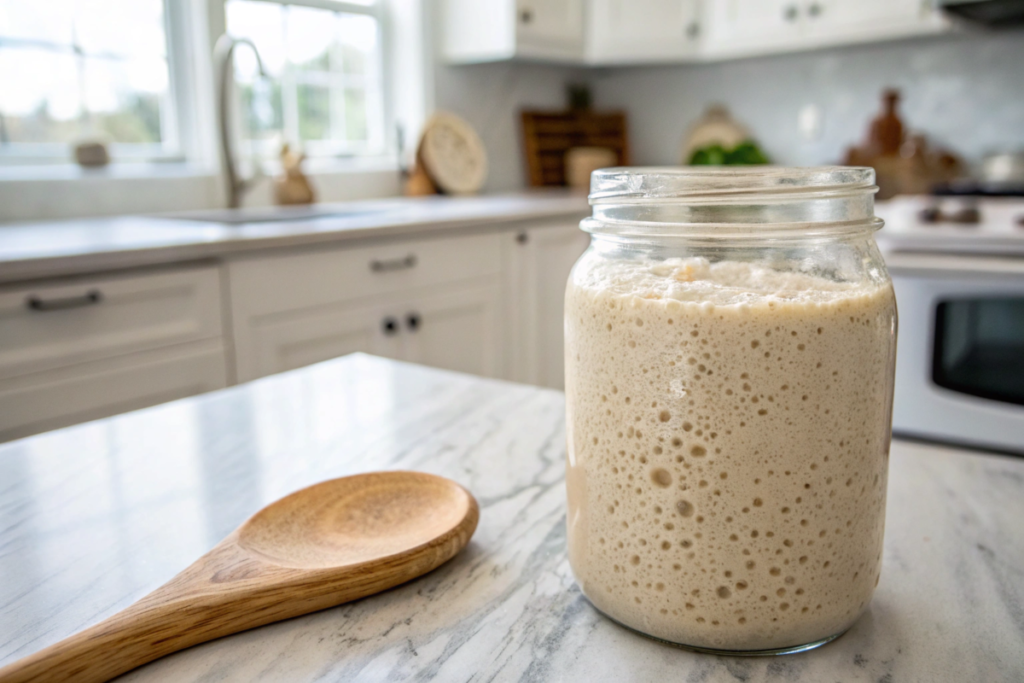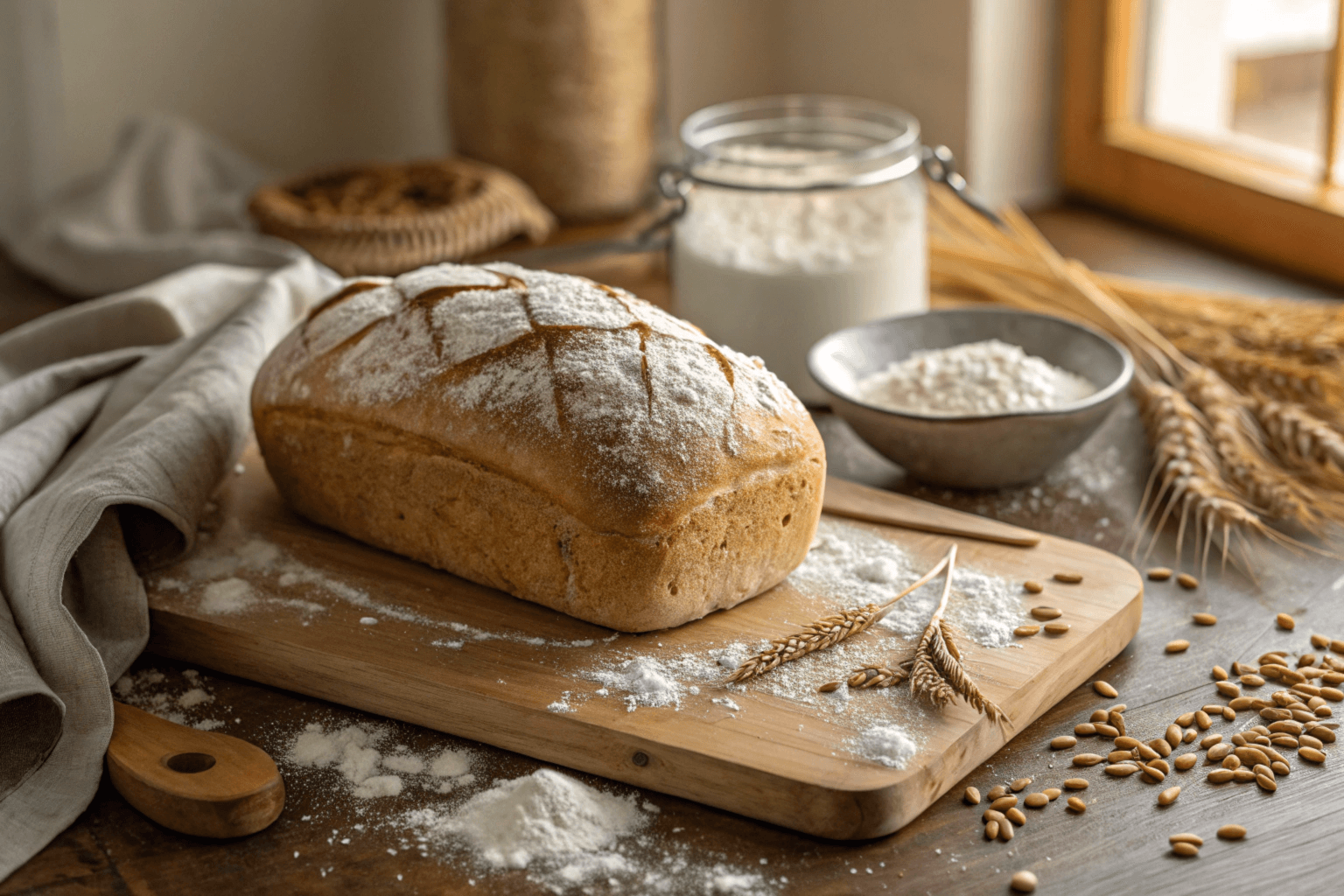Why is Sourdough Bread Not Fattening?
Sourdough bread has captured the hearts (and taste buds) of many, but what makes it unique? Unlike its counterparts, sourdough is crafted through a fascinating fermentation process that not only transforms its flavor but also influences its nutritional profile. In this article, we’ll dive deep into why sourdough bread is considered a weight-friendly option, explore its health benefits, and bust some common myths. By the end, you’ll understand why this tangy bread might deserve a spot in your diet.
Understanding Sourdough Bread
What is Sourdough Bread?
Sourdough bread is not your typical loaf. It’s made through a natural fermentation process involving wild yeast and bacteria (commonly Lactobacillus). This process creates the bread’s distinct tangy flavor and chewy texture. Unlike commercial bread, which often relies on fast-rising yeast, sourdough takes its time.
But why does this matter? The slow fermentation breaks down complex carbohydrates, making sourdough easier to digest. Plus, the minimal ingredients—flour, water, and salt—ensure a cleaner, more natural product, free from unnecessary additives. No wonder it’s a favorite among health enthusiasts!
Nutritional Profile of Sourdough
Sourdough bread shines with its balanced nutritional profile. It’s rich in complex carbohydrates, providing steady energy, and contains essential nutrients like B vitamins, iron, and magnesium. Surprisingly, it also has lower glycemic index compared to regular bread, meaning it doesn’t spike blood sugar levels as drastically.
Additionally, the fermentation process enhances its bioavailability. This means your body absorbs more of the nutrients, making sourdough a nutrient-dense choice. While it’s not calorie-free, its unique properties can help with portion control, which plays a crucial role in weight management.
The Fermentation Advantage
How Fermentation Reduces Calories and Carbs
Fermentation is the magic that sets sourdough bread apart. Unlike regular bread, sourdough undergoes a slow fermentation process, where natural yeast and lactic acid bacteria break down complex carbohydrates. This process doesn’t just enhance flavor—it lowers the calorie and carb content per serving.

Thanks to this breakdown, sourdough has a lower glycemic index (GI) than other breads. Foods with a low GI release sugar gradually into the bloodstream, avoiding sudden spikes in blood sugar. For those aiming to manage weight or avoid energy crashes, this makes sourdough a smarter choice. Want to enjoy bread without the guilt? Sourdough’s fermentation process could be the answer.
Impact of Fermented Foods on Digestion
Here’s another win: fermentation improves gut health. Sourdough bread is packed with natural probiotics that promote a healthy gut microbiome. A well-functioning gut can influence everything from digestion to metabolism, which are crucial for weight management. Why is sourdough bread not fattening? It’s partly because it aids in smoother digestion, which prevents bloating and helps you feel lighter.
Additionally, the fermentation process reduces phytic acid, a compound that can block nutrient absorption. This means your body absorbs more iron, magnesium, and zinc from sourdough compared to other bread. A healthy digestive system combined with improved nutrient uptake can make all the difference in your overall health.
Role in Weight Loss and Maintenance
Is Sourdough Bread Good for Weight Loss?
When it comes to weight loss, sourdough bread holds an edge over its competitors. Its unique properties help you feel fuller longer, reducing the urge to snack. Unlike ultra-processed white bread, which offers little nutritional value, sourdough is nutrient-dense, making it easier to maintain portion control.
Interestingly, the slower digestion of sourdough’s complex carbohydrates stabilizes blood sugar levels. Stable blood sugar helps prevent the insulin spikes that can lead to fat storage. Compared to refined bread, sourdough offers a balanced option for anyone mindful of their caloric intake.
Sourdough Bread and Metabolism
Metabolism plays a huge role in weight management, and sourdough bread contributes positively. Thanks to its fermentation process, sourdough contains short-chain fatty acids (SCFAs), which can boost metabolism. These compounds, produced during fermentation, help regulate fat storage and improve insulin sensitivity.
Moreover, the slow energy release from sourdough bread keeps you fueled for longer periods, making it ideal for active lifestyles. By replacing high-GI breads with sourdough, you can support a steady metabolism, which is key to maintaining a healthy weight.
Health Benefits Beyond Weight
Nutritional Density and Health Outcomes
Sourdough bread is not just weight-friendly; it’s a nutrient powerhouse. Unlike conventional bread, sourdough undergoes fermentation, which enhances the availability of essential nutrients. It’s rich in B vitamins, iron, and magnesium—nutrients that play vital roles in energy production and overall health.
Another advantage lies in its low glycemic index, which helps maintain consistent blood sugar levels. This feature makes sourdough an excellent choice for individuals managing diabetes or those seeking sustained energy throughout the day. Whether you’re focused on weight management or boosting your nutrient intake, sourdough delivers a well-rounded health profile.
If you’re looking for more nutritious and flavorful bread recipes, check out the Pumpkin Banana Loaf on our site for an autumn-inspired treat packed with nutrients.
Impact on Inflammation and Chronic Diseases
Another reason sourdough is gaining popularity is its potential anti-inflammatory benefits. The fermentation process reduces compounds like gluten and phytic acid, which can cause inflammation in sensitive individuals. For those with mild gluten sensitivities, sourdough bread might be easier to digest.
Moreover, its fiber content supports heart health by lowering cholesterol levels. Research suggests that diets rich in fermented foods can reduce the risk of chronic diseases, including heart disease and type 2 diabetes. Why is sourdough bread not fattening? One reason is its nutrient density and anti-inflammatory properties, which promote overall health and balance in the body.
Myths and Facts about Sourdough Bread
Common Misconceptions
One common myth is that sourdough bread is carb-free or calorie-free. While it does offer unique benefits, it’s still bread and contains carbs. However, its slower digestion and nutrient-packed profile make it a better option than processed alternatives. So, while it’s not a miracle food, it’s definitely a smarter choice for bread lovers.
Another misconception is that sourdough is completely gluten-free. Though the fermentation process breaks down some gluten, it’s not suitable for people with celiac disease. Understanding these nuances ensures you can enjoy sourdough without overestimating its capabilities.
Why It’s Not a Miracle Food
Sourdough bread is an excellent choice for a balanced diet, but it’s not a free pass to indulge endlessly. Like any food, portion control is key. Pairing sourdough with healthy toppings—like avocado or lean protein—maximizes its benefits without tipping the calorie scale. It’s important to remember that maintaining a healthy lifestyle involves variety and moderation.
How Sourdough Supports Digestive Health
The Role of Prebiotics and Probiotics in Sourdough
One of the standout benefits of sourdough bread is its impact on gut health. Thanks to the fermentation process, sourdough bread is naturally rich in prebiotics and probiotics. Prebiotics serve as food for the good bacteria in your gut, while probiotics introduce live beneficial bacteria. Together, these compounds improve digestion and boost the overall health of your microbiome.
The probiotics in sourdough also contribute to its weight-friendly reputation. They help regulate digestion, reduce bloating, and optimize nutrient absorption. Why is sourdough bread not fattening? A part of the answer lies in how it enhances your body’s efficiency in processing nutrients.
Reduced Phytates for Better Nutrient Absorption
Phytic acid, commonly found in grains, can block your body from absorbing important nutrients like iron and magnesium. The fermentation process in sourdough reduces these compounds significantly, making it easier for your body to reap the benefits of the bread’s nutrients. This improved nutrient uptake not only supports a healthier body but also reduces cravings, which can be a hidden culprit behind weight gain.
By aiding digestion and nutrient absorption, sourdough bread provides a win-win solution for those looking to maintain a healthy weight while still enjoying their favorite baked goods.
The Science Behind Its Weight-Friendly Reputation
Why Is Sourdough Bread Not Fattening?
Sourdough bread’s unique fermentation process sets it apart as a weight-friendly option. During fermentation, the breakdown of carbohydrates results in a lower glycemic index. This means sourdough doesn’t cause the sharp blood sugar spikes that processed breads do, which helps avoid the dreaded sugar crash and subsequent hunger pangs.
Moreover, the combination of fiber, prebiotics, and probiotics promotes satiety. This means you’re less likely to overeat, as sourdough helps you feel full longer. Compared to traditional bread, sourdough provides more sustained energy, making it ideal for those focused on balanced weight management.
A Balanced Bread for All Diets
Sourdough bread is versatile and works well in a variety of diets. Whether you’re following a low-carb approach or simply looking for a healthier option, sourdough fits seamlessly. Its combination of slow-digesting carbs and rich nutrients makes it an excellent choice for anyone aiming to control their weight without sacrificing flavor.

For more healthy and delicious bread options, check out our Pumpkin Sourdough Recipe for a seasonal twist on this classic.
The Environmental and Ethical Appeal of Sourdough
Natural Ingredients and Sustainability
Sourdough bread stands out for more than its health benefits; its environmental footprint is also appealing. Made from simple, natural ingredients like flour, water, and salt, sourdough avoids the artificial additives and preservatives found in many commercial breads. This minimalist approach not only benefits your health but also reduces the environmental impact of production.
The fermentation process, powered by wild yeast and bacteria, is energy-efficient compared to industrial bread-making methods. Additionally, sourdough is often baked locally, cutting down on transportation emissions. If you’re looking for a bread that aligns with sustainable living, sourdough checks all the boxes.
Supporting Local Bakers and Ethical Practices
Sourdough’s popularity has revitalized artisanal baking, with many small bakeries and home bakers embracing the traditional method. By choosing sourdough from local sources, you’re supporting ethical, small-scale businesses that prioritize quality over quantity. This shift away from mass-produced bread also encourages responsible farming practices and reduces reliance on monocultures.
With its blend of health, environmental, and ethical benefits, sourdough bread appeals to conscious consumers looking for wholesome, sustainable choices. It’s no wonder many ask, Why is sourdough bread not fattening? The answer often extends beyond nutrition to the thoughtful processes behind its creation.
Tips for Including Sourdough in a Healthy Diet
Making the Most of Sourdough Bread
To maximize the benefits of sourdough bread, pair it with nutrient-dense toppings. Avocado, eggs, or lean proteins complement sourdough’s fiber and slow-digesting carbs, creating a balanced meal. For a sweet option, consider almond butter with fresh fruit. These combinations enhance satiety and help maintain stable energy levels.
When it comes to portion sizes, moderation is key. While sourdough has unique benefits, it’s still important to keep your intake in check to maintain a healthy calorie balance. Incorporating sourdough into meals rather than making it the main focus ensures you enjoy its perks without overindulging.
Baking Your Own Sourdough
For the ultimate fresh experience, consider baking sourdough at home. It’s a rewarding process that gives you control over ingredients and flavors. Start with a simple recipe, like a classic sourdough loaf, and experiment with add-ins like seeds or herbs. Not only is homemade sourdough healthier, but it’s also cost-effective and deeply satisfying.
If you’re new to baking, check out the Pumpkin Banana Loaf Recipe for inspiration. While not sourdough, it’s another delicious way to explore wholesome, homemade bread options.

